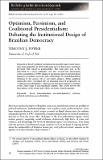| dc.contributor.author |
Timothy J. Power |
| dc.coverage.spatial |
United Kingdom |
| dc.date.accessioned |
2016-01-07T15:28:17Z |
| dc.date.available |
2016-01-07T15:28:17Z |
| dc.identifier.uri |
http://desa1.cejamericas.org:8080/handle/2015/2943 |
| dc.description.abstract |
Research on Brazil’s political institutions has gone through several phases since democratization in 1985. In the early years of democracy, pessimism prevailed with regard to governability. This view gave way in the mid-1990s to a more optimistic view that stressed two innovations of the Constitution of 1988: enhanced presidential power and centralized legislative procedure. In recent years, a third phase of research has shifted attention to the crucial role of inter-party alliances. These analytical approaches have converged into an emerging research program on ‘coalitional presidentialism’, which places executive-legislative relations at the center stage of macropolitical analysis. This article reviews the three phases of the debate and reflects on future research agendas. |
| dc.language.iso |
English |
| dc.title |
Optimism, Pessimism, and Coalitional Presidentialism: Debating the Institutional Design of Brazilian |
| dc.ceja.source |
Fuente: Journal of the Society for Latin American Studies |

